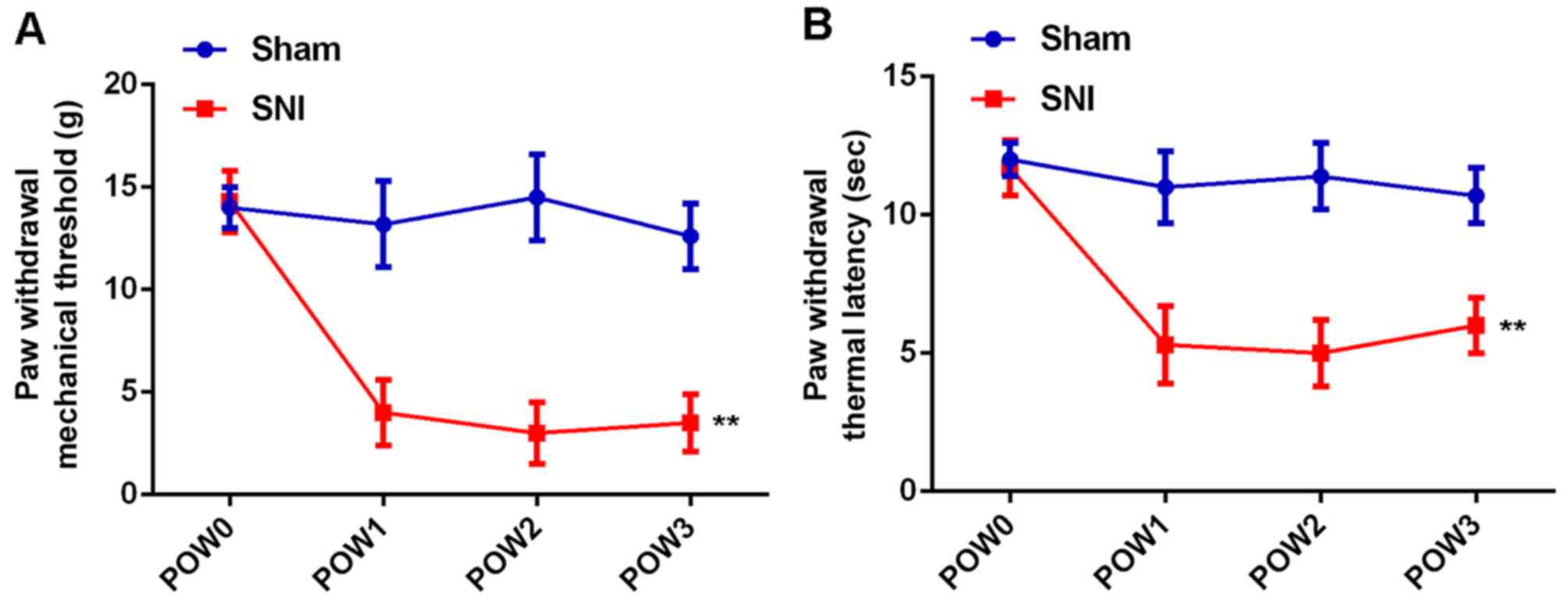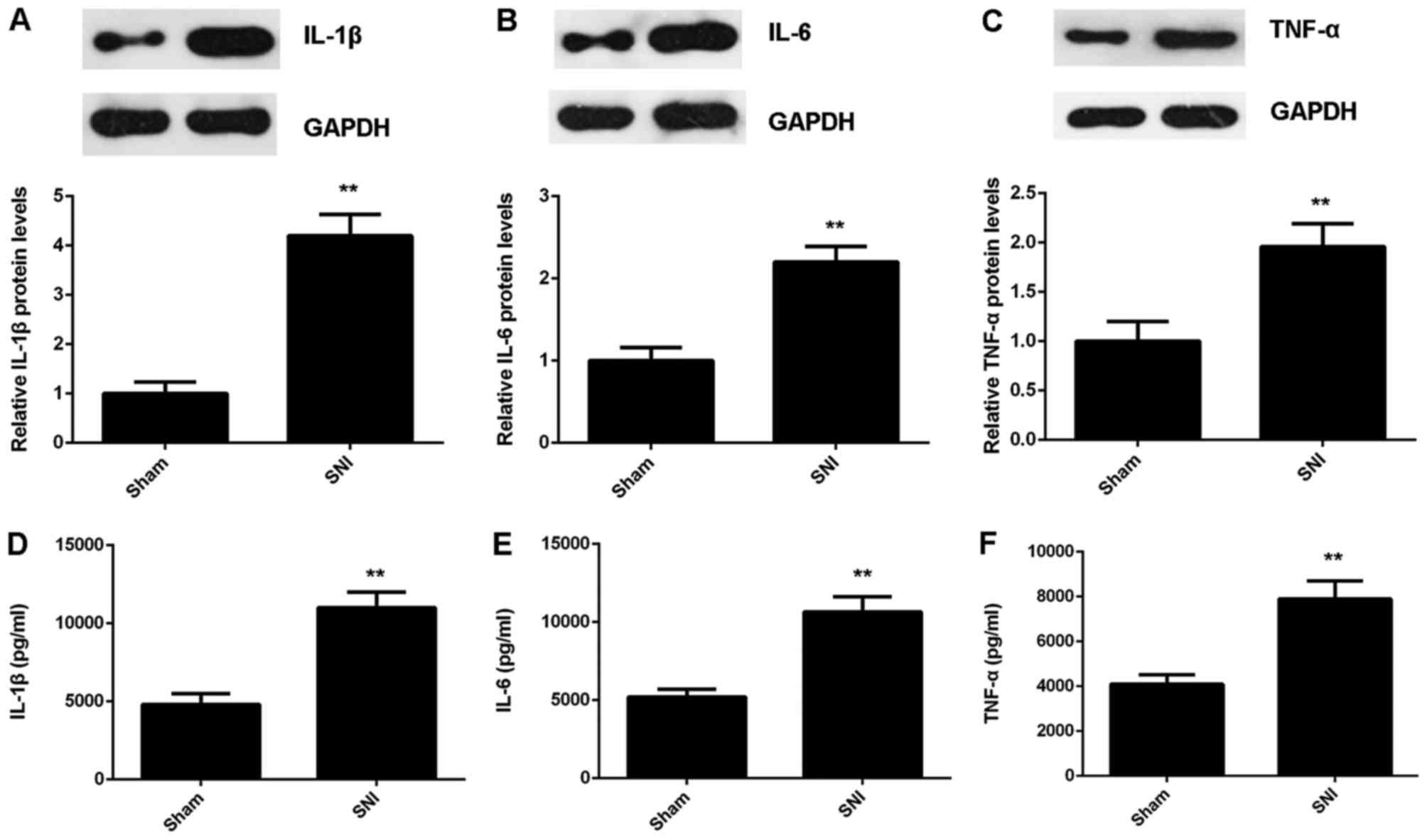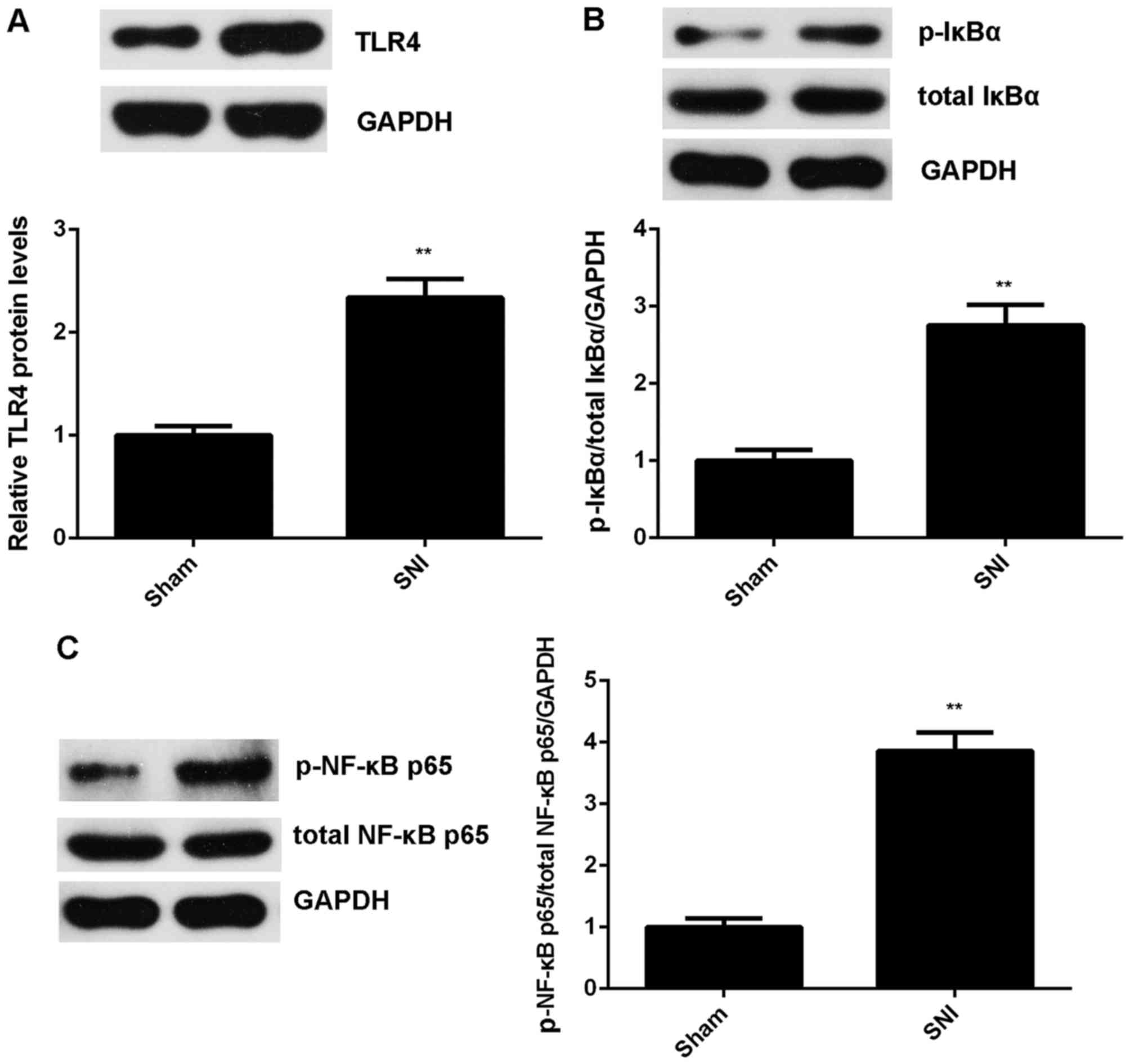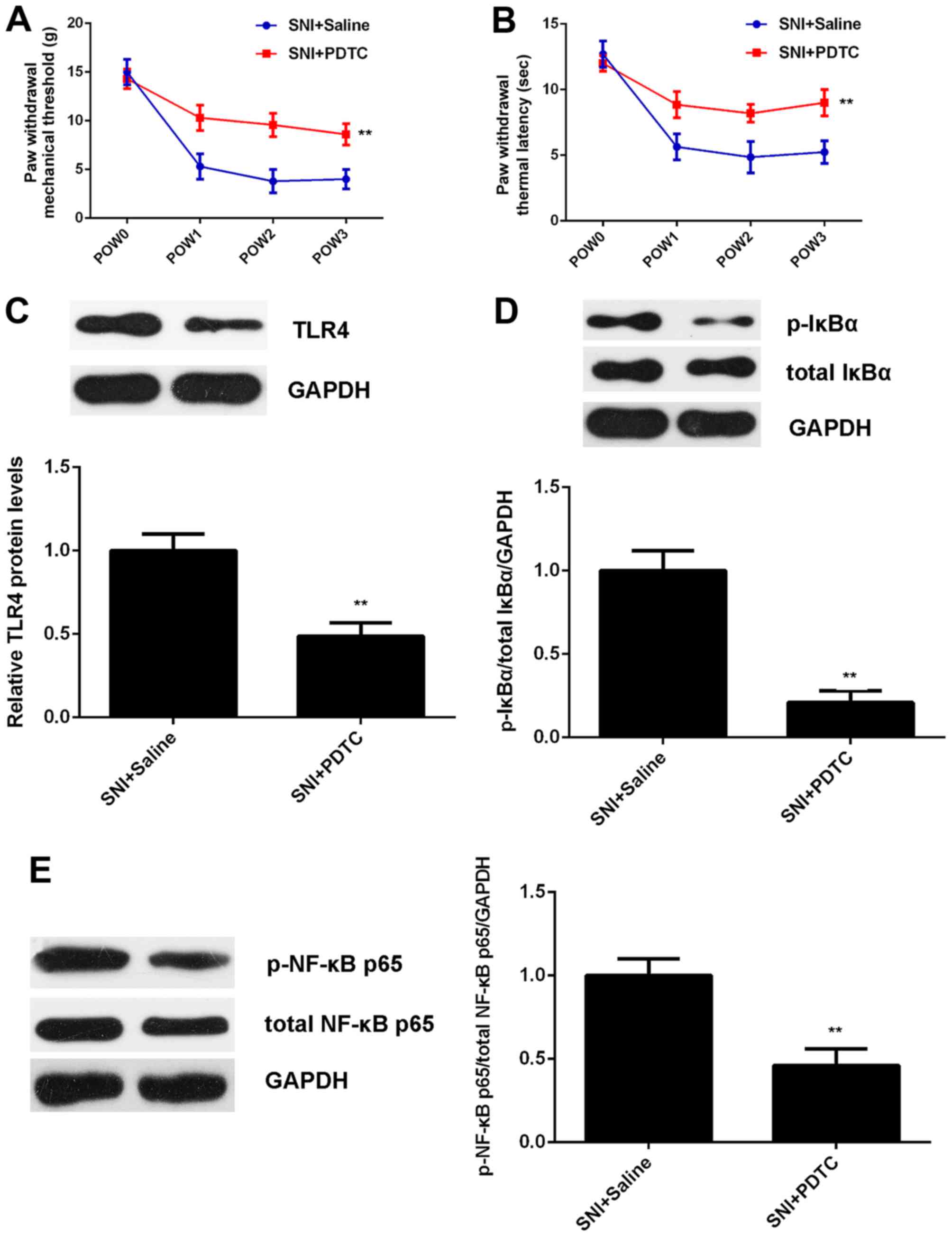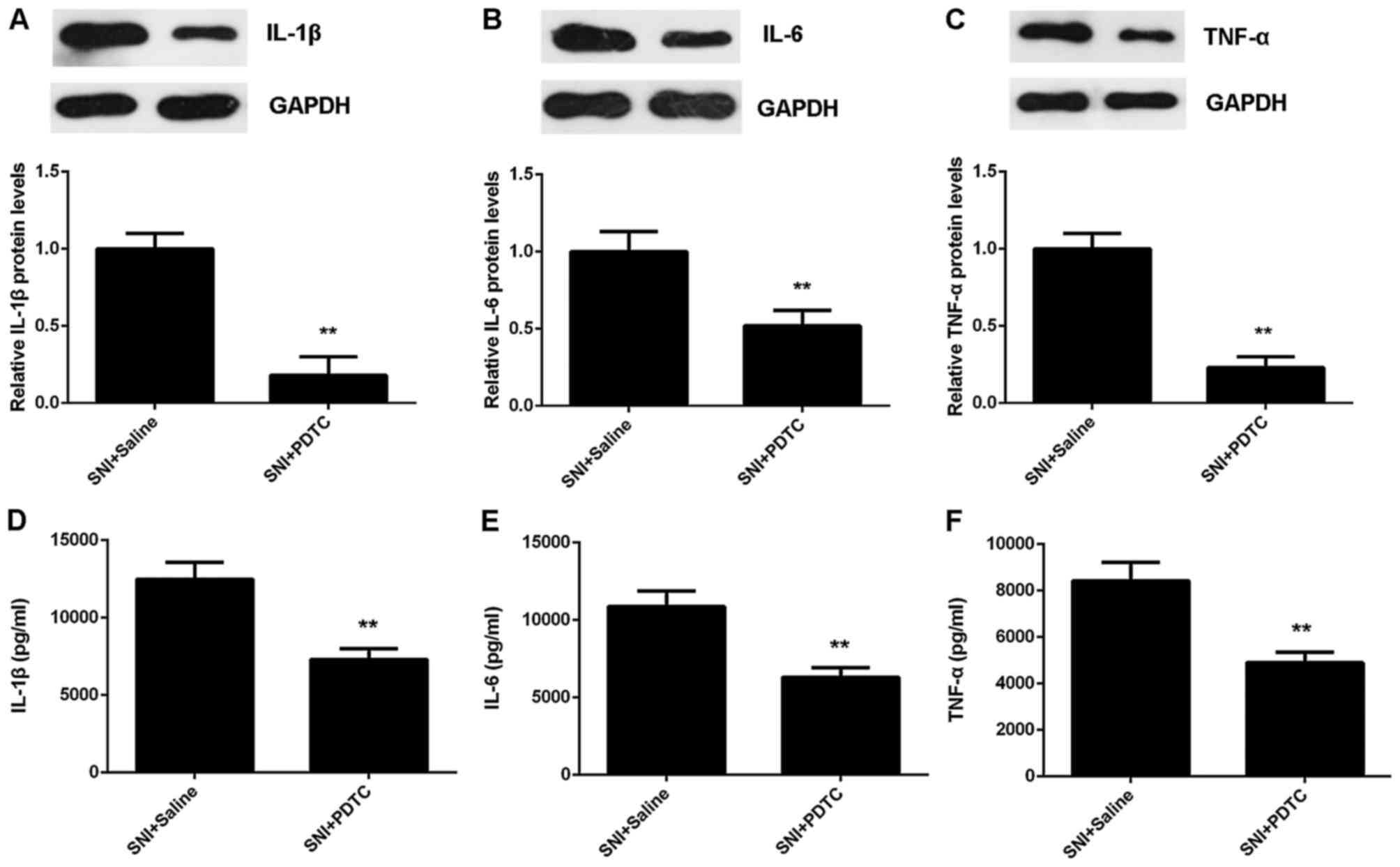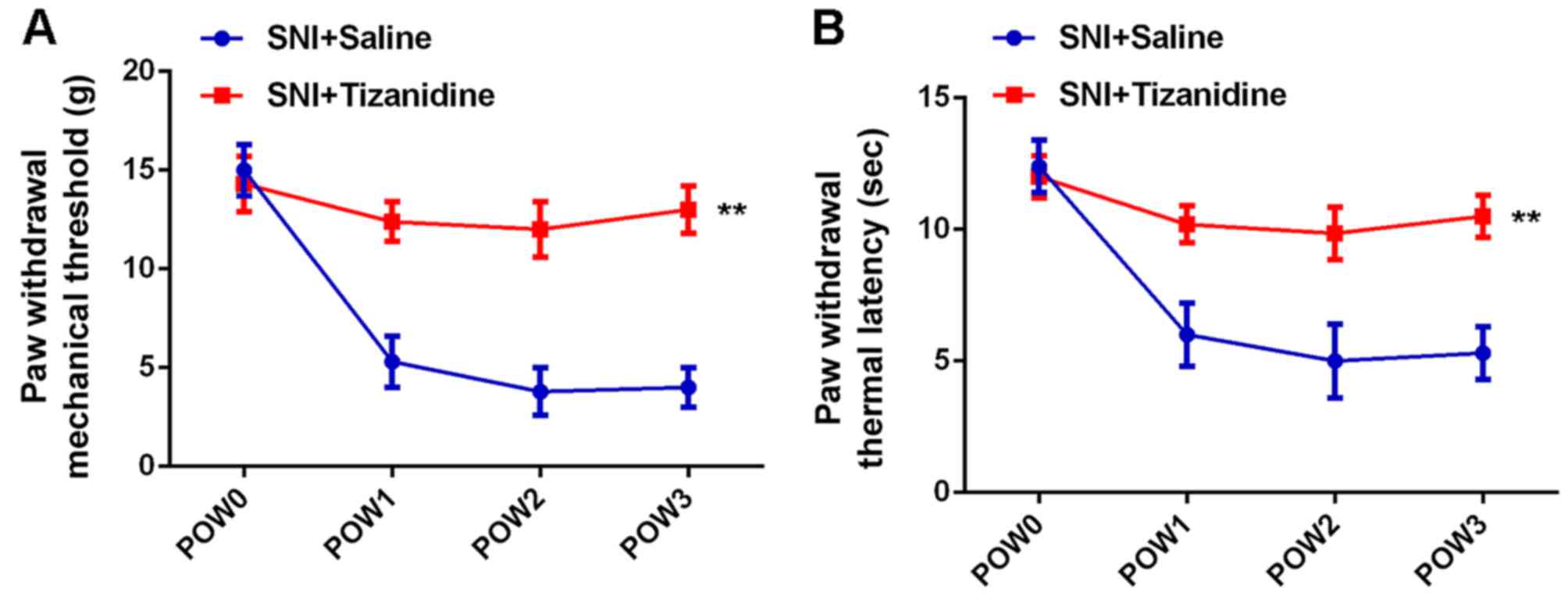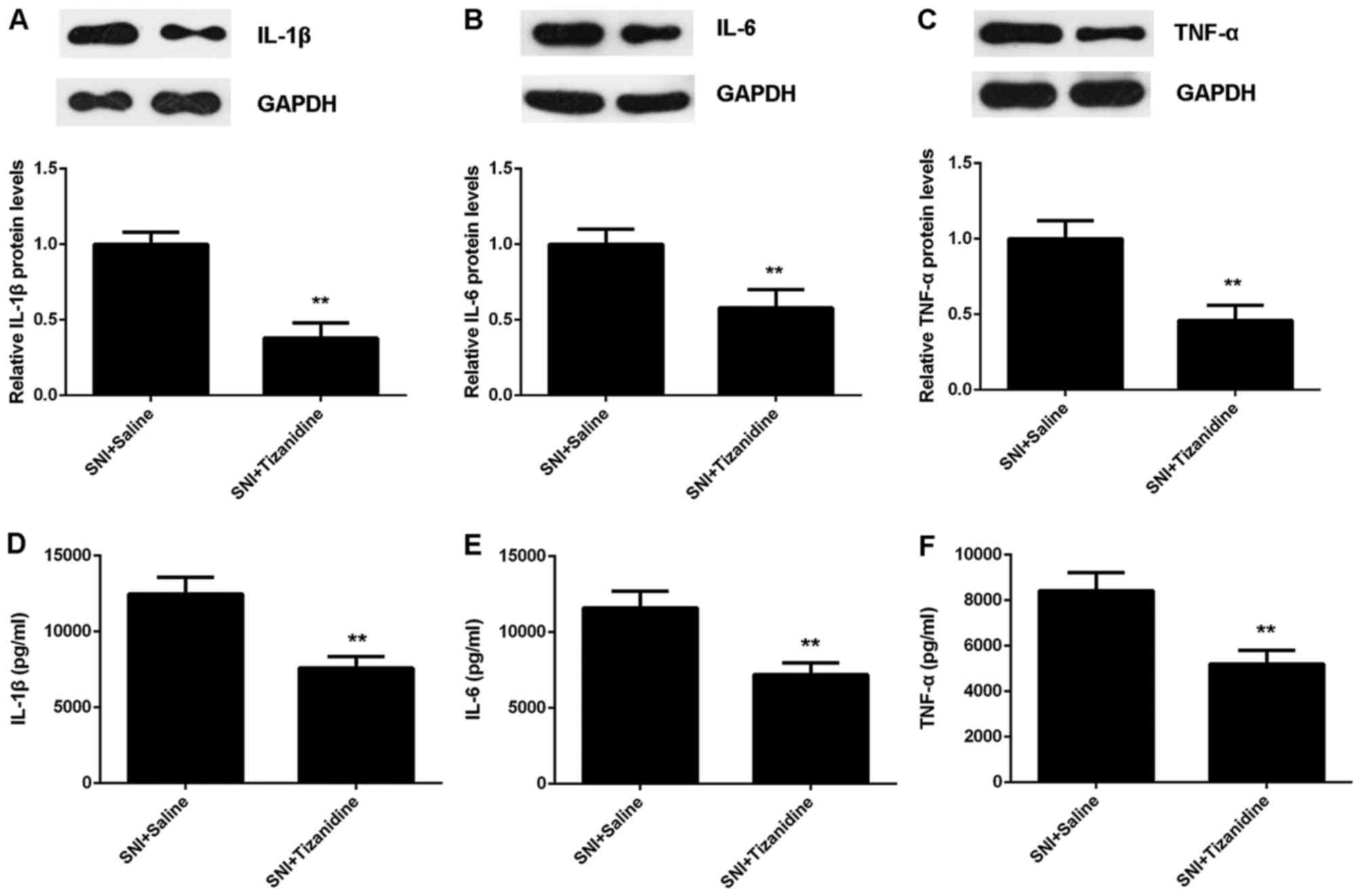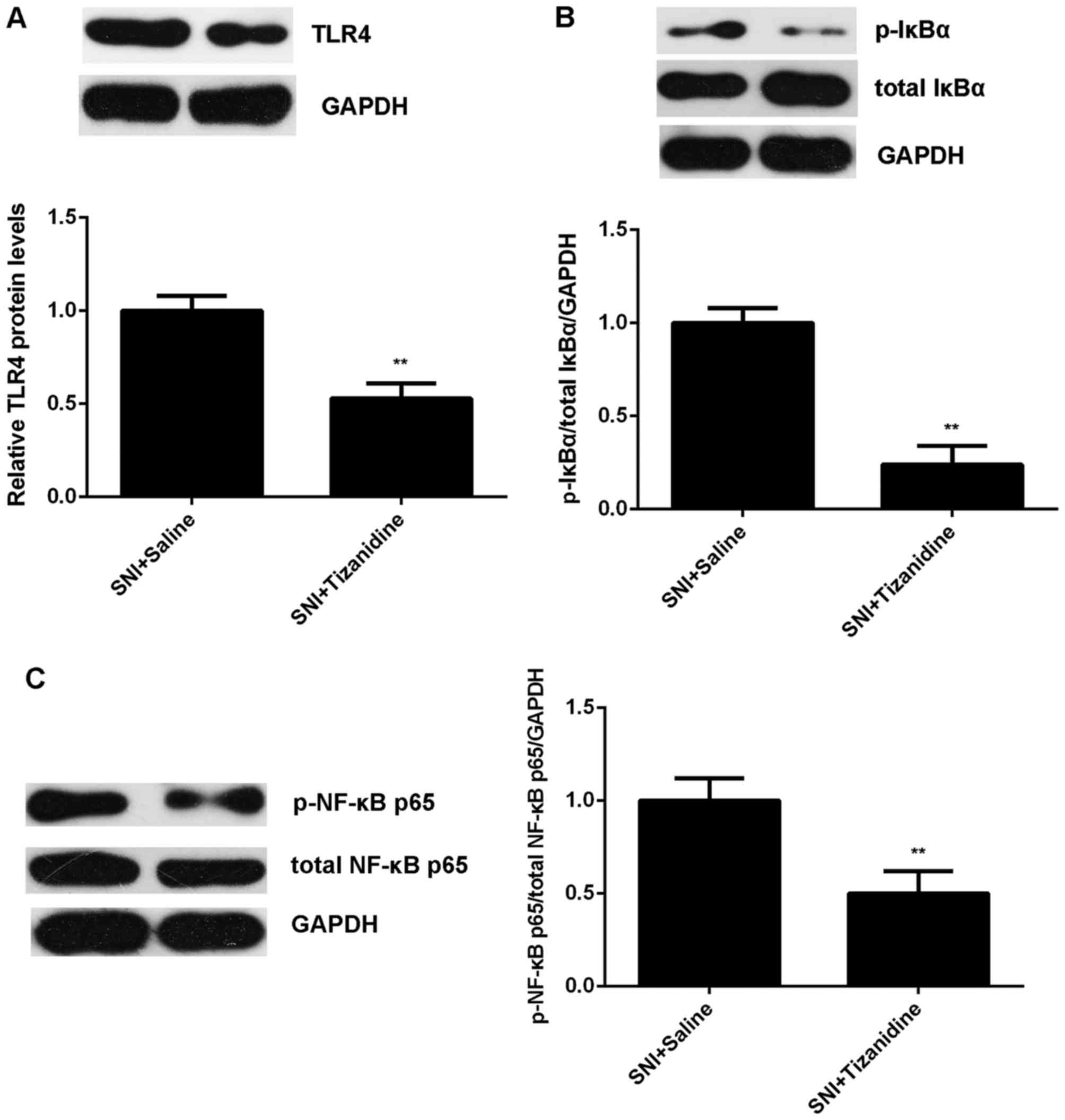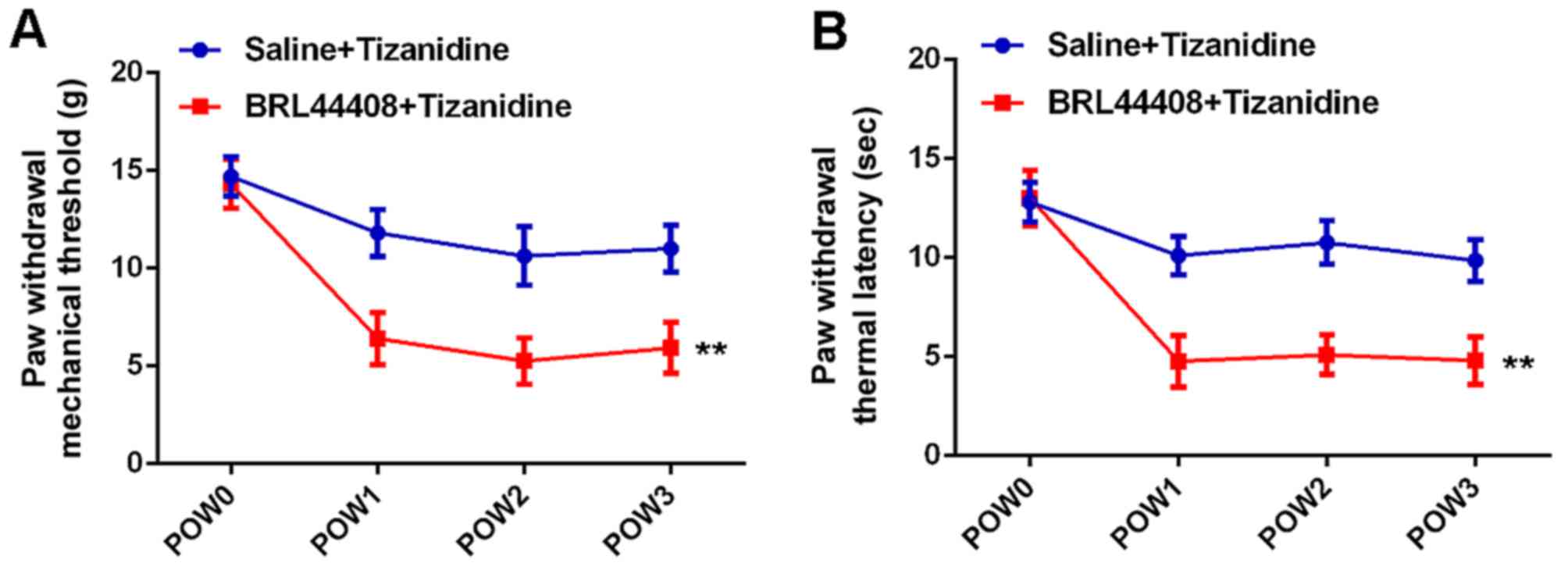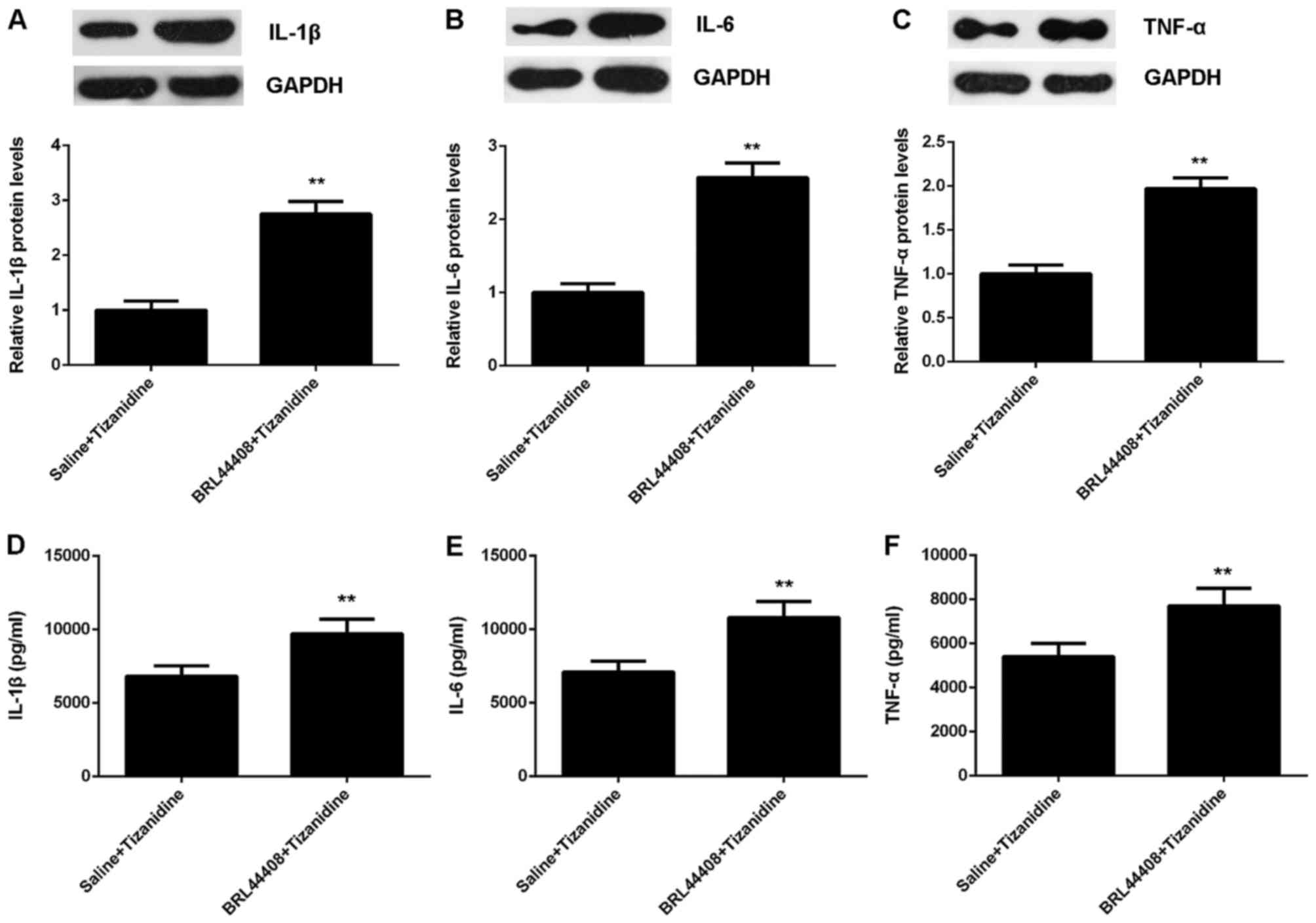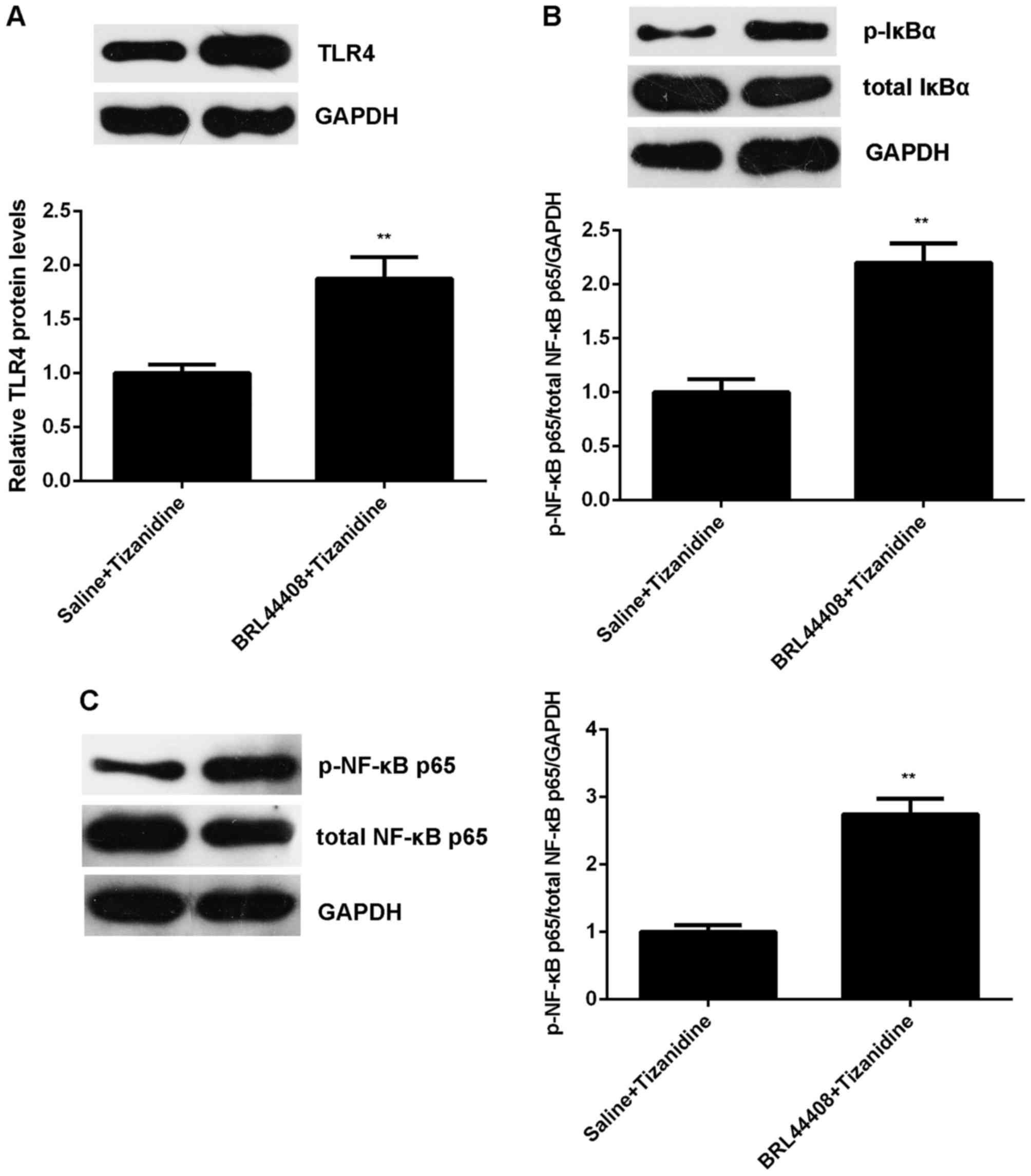|
1
|
Yang YK, Lu XB, Wang YH, Yang MM and Jiang
DM: Identification crucial genes in peripheral neuropathic pain
induced by spared nerve injury. Eur Rev Med Pharmacol Sci.
18:2152–2159. 2014.PubMed/NCBI
|
|
2
|
Decosterd I and Woolf CJ: Spared nerve
injury: An animal model of persistent peripheral neuropathic pain.
Pain. 87:149–158. 2000. View Article : Google Scholar : PubMed/NCBI
|
|
3
|
Yoon SY, Kang SY, Kim HW, Kim HC and Roh
DH: Clonidine reduces nociceptive responses in mouse orofacial
formalin model: Potentiation by Sigma-1 receptor antagonist BD1047
without impaired motor coordination. Biol Pharm Bull. 38:1320–1327.
2015. View Article : Google Scholar : PubMed/NCBI
|
|
4
|
Li SS, Zhang WS, Ji D, Zhou YL, Li H, Yang
JL, Xiong YC, Zhang YQ and Xu H: Involvement of spinal microglia
and interleukin-18 in the anti-nociceptive effect of
dexmedetomidine in rats subjected to CCI. Neurosci Lett. 560:21–25.
2014. View Article : Google Scholar
|
|
5
|
Mirbagheri MM, Chen D and Rymer WZ:
Quantification of the effects of an alpha-2 adrenergic agonist on
reflex properties in spinal cord injury using a system
identification technique. J Neuroeng Rehabil. 7:292010. View Article : Google Scholar : PubMed/NCBI
|
|
6
|
Kawamata T, Omote K, Yamamoto H, Toriyabe
M, Wada K and Namiki A: Antihyperalgesic and side effects of
intrathecal clonidine and tizanidine in a rat model of neuropathic
pain. Anesthesiology. 98:1480–1483. 2003. View Article : Google Scholar : PubMed/NCBI
|
|
7
|
Davies J and Johnston SE: Selective
antinociceptive effects of tizanidine (DS 103-282), a centrally
acting muscle relaxant, on dorsal horn neurones in the feline
spinal cord. Br J Pharmacol. 82:409–421. 1984. View Article : Google Scholar : PubMed/NCBI
|
|
8
|
Koyuncuŏglu H, Ariciŏglu F, Uresin Y,
Dizdar Y and Esin Y: Effects of tizanidine on morphine physical
dependence: Attenuation and intensification. Pharmacol Biochem
Behav. 42:693–698. 1992. View Article : Google Scholar
|
|
9
|
Yazicioğlu D, Caparlar C, Akkaya T, Mercan
U and Kulaçoğlu H: tizanidine for the management of acute
postoperative pain after inguinal hernia repair: A
placebo-controlled double-blind trial. Eur J Anaesthesiol.
33:215–222. 2016. View Article : Google Scholar
|
|
10
|
Kabayel DD, Ozdemir F, Unlu E, Bilgili N
and Murat S: The effects of medical treatment and rehabilitation in
a patient with adult tethered cord syndrome in the late
postoperative period. Med Sci Monit. 13:CS141–CS144.
2007.PubMed/NCBI
|
|
11
|
Roy A, Srivastava M, Saqib U, Liu D,
Faisal SM, Sugathan S, Bishnoi S and Baig MS: Potential therapeutic
targets for inflammation in toll-like receptor 4 (TLR4)-mediated
signaling pathways. Int Immunopharmacol. 40:79–89. 2016. View Article : Google Scholar : PubMed/NCBI
|
|
12
|
Rocha DM, Caldas AP, Oliveira LL, Bressan
J and Hermsdorff HH: Saturated fatty acids trigger TLR4-mediated
inflammatory response. Atherosclerosis. 244:211–215. 2016.
View Article : Google Scholar
|
|
13
|
Zhang J, Xia J, Zhang Y, Xiao F, Wang J,
Gao H, Liu Y, Rong S, Yao Y, Xu G, et al: HMGB1 TLR4 signaling
participates in renal ischemia reperfusion injury and could be
attenuated by dexamethasone-mediated inhibition of the ERK/NF-κB
pathway. Am J Transl Res. 8:4054–4067. 2016.
|
|
14
|
Liu DL, Zhao LX, Zhang S and Du JR:
Peroxiredoxin 1-mediated activation of TLR4/NF-κB pathway
contributes to neuroinflammatory injury in intracerebral
hemorrhage. Int Immunopharmacol. 41:82–89. 2016. View Article : Google Scholar : PubMed/NCBI
|
|
15
|
Zhu S, Hu X, Tao Y, Ping Z, Wang L, Shi J,
Wu X, Zhang W, Yang H, Nie Z, et al: Strontium inhibits titanium
particle-induced osteoclast activation and chronic inflammation via
suppression of NF-κB pathway. Sci Rep. 6:362512016. View Article : Google Scholar
|
|
16
|
Huang Y, Chen R and Zhou J: E2F1 and
NF-κB: Key mediators of inflammation-associated cancers and
potential therapeutic targets. Curr Cancer Drug Targets.
16:765–772. 2016. View Article : Google Scholar
|
|
17
|
Fuentes E, Rojas A and Palomo I: NF-κB
signaling pathway as target for antiplatelet activity. Blood Rev.
30:309–315. 2016. View Article : Google Scholar : PubMed/NCBI
|
|
18
|
Pujari R, Hunte R, Khan WN and Shembade N:
A20-mediated negative regulation of canonical NF-κB signaling
pathway. Immunol Res. 57:166–171. 2013. View Article : Google Scholar : PubMed/NCBI
|
|
19
|
Schuster M, Annemann M, Plaza-Sirvent C
and Schmitz I: Atypical IκB proteins - nuclear modulators of NF-κB
signaling. Cell Commun Signal. 11:232013. View Article : Google Scholar
|
|
20
|
Dos Reis RC, Kopruszinski CM, Nones CF and
Chichorro JG: Nerve growth factor induces facial heat hyperalgesia
and plays a role in trigeminal neuropathic pain in rats. Behav
Pharmacol. 27:528–535. 2016. View Article : Google Scholar : PubMed/NCBI
|
|
21
|
Gong SS, Li YX, Zhang MT, Du J, Ma PS, Yao
WX, Zhou R, Niu Y, Sun T and Yu JQ: Neuroprotective effect of
matrine in mouse model of vincristine-induced neuropathic pain.
Neurochem Res. 41:3147–3159. 2016. View Article : Google Scholar : PubMed/NCBI
|
|
22
|
Kobiela Ketz A, Byrnes KR, Grunberg NE,
Kasper CE, Osborne L, Pryor B, Tosini NL, Wu X and Anders JJ:
Characterization of macrophage/microglial activation and effect of
photobiomodulation in the spared nerve injury model of neuropathic
pain. Pain Med. 18:932–946. 2017.
|
|
23
|
Ko MH, Yang ML, Youn SC, Lan CT and Tseng
TJ: Intact subepidermal nerve fibers mediate mechanical
hypersensitivity via the activation of protein kinase C gamma in
spared nerve injury. Mol Pain. 12:pii: 17448069166561892016.
View Article : Google Scholar
|
|
24
|
Tilley DM, Cedeño DL, Kelley CA, Benyamin
R and Vallejo R: Spinal cord stimulation modulates gene expression
in the spinal cord of an animal model of peripheral nerve injury.
Reg Anesth Pain Med. 41:750–756. 2016. View Article : Google Scholar : PubMed/NCBI
|
|
25
|
Curto-Reyes V, Kirschmann G, Pertin M,
Drexler SK, Decosterd I and Suter MR: Neuropathic pain phenotype
does not involve the NLRP3 inflammasome and its end product
interleukin-1β in the mice spared nerve injury model. PLoS One.
10:e01337072015. View Article : Google Scholar
|
|
26
|
Ding CP, Xue YS, Yu J, Guo YJ, Zeng XY and
Wang JY: The red nucleus interleukin-6 participates in the
maintenance of neuropathic pain induced by spared nerve injury.
Neurochem Res. 41:3042–3051. 2016. View Article : Google Scholar : PubMed/NCBI
|
|
27
|
Gui WS, Wei X, Mai CL, Murugan M, Wu LJ,
Xin WJ, Zhou LJ and Liu XG: Interleukin-1β overproduction is a
common cause for neuropathic pain, memory deficit, and depression
following peripheral nerve injury in rodents. Mol Pain. 12:pii:
17448069166467842016. View Article : Google Scholar
|
|
28
|
Li X, Wang J, Wang Z, Dong C, Dong X, Jing
Y, Yuan Y and Fan G: Tumor necrosis factor-α of Red nucleus
involved in the development of neuropathic allodynia. Brain Res
Bull. 77:233–236. 2008. View Article : Google Scholar : PubMed/NCBI
|
|
29
|
Liu L, Ji F, Liang J, He H, Fu Y and Cao
M: Inhibition by dexmedetomidine of the activation of spinal dorsal
horn glias and the intracellular ERK signaling pathway induced by
nerve injury. Brain Res. 1427:1–9. 2012. View Article : Google Scholar
|
|
30
|
Buerkle H and Yaksh TL: Pharmacological
evidence for different alpha 2-adrenergic receptor sites mediating
analgesia and sedation in the rat. Br J Anaesth. 81:208–215. 1998.
View Article : Google Scholar : PubMed/NCBI
|
|
31
|
Malanga G, Reiter RD and Garay E: Update
on tizanidine for muscle spasticity and emerging indications.
Expert Opin Pharmacother. 9:2209–2215. 2008. View Article : Google Scholar : PubMed/NCBI
|
|
32
|
Henney HR III and Chez M: Pediatric safety
of tizanidine: Clinical adverse event database and retrospective
chart assessment. Paediatr Drugs. 11:397–406. 2009. View Article : Google Scholar : PubMed/NCBI
|
|
33
|
Ou-Yang HD, Zeng WA, Li Q, He WX, Wang PZ,
Lin LL, Zhang ZQ and Liu XG: Effects of intrathecal ouabain and
tizanidine injection for treatment of neuropathic pain in rats. Nan
Fang Yi Ke Da Xue Xue Bao. 28:1760–1763. 2008.In Chinese.
PubMed/NCBI
|
|
34
|
Leiphart JW, Dills CV and Levy RM:
Alpha2-adrenergic receptor subtype specificity of intrathecally
administered tizanidine used for analgesia for neuropathic pain. J
Neurosurg. 101:641–647. 2004. View Article : Google Scholar : PubMed/NCBI
|















